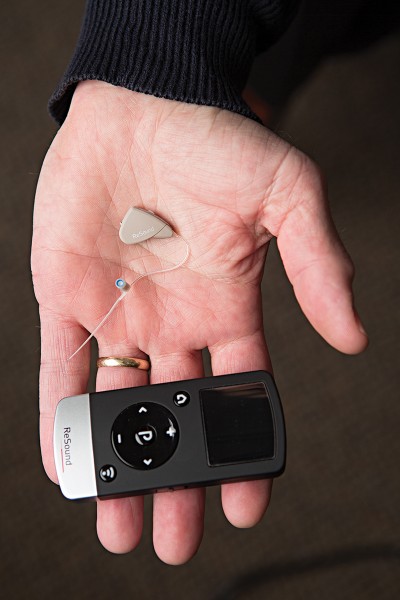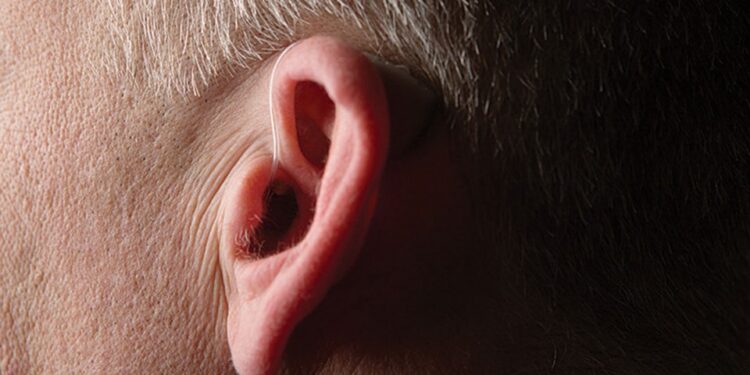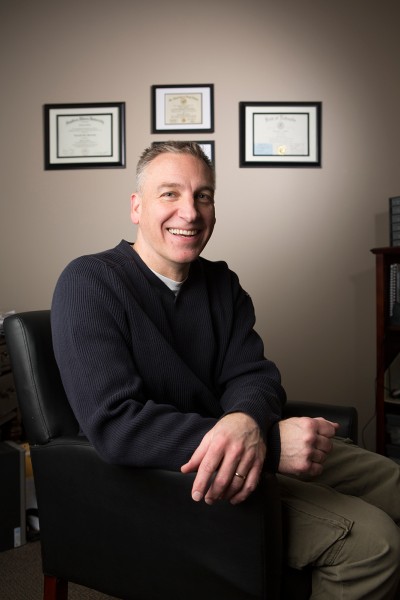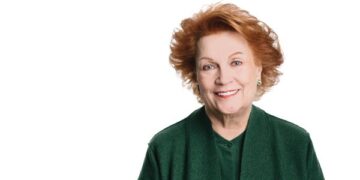The laughter of little children, family chatter at the dinner table, a favorite song on the radio, or even the breeze rustling through the trees…All of these are sounds that we often take for granted. But for those who are struggling with hearing loss, even these simple occurrences take on new importance and are missed more than ever before.
According to the National Institute on Deafness and Other Communication Disorders (asha.org), “Thirty percent of adults 65-74 years old, and 47 percent of adults 75 years old or older have a hearing loss.” While that statistic can seem discouraging, the bright side is that, with today’s treatments and advances in technology, there is no real reason that hearing loss is a permanent condition.
Britt A. Thedinger, M.D., of Ear Specialists of Omaha, says that there are several types of hearing loss, and they are not limited to seniors. Some causes of diminished hearing may be overexposure to noise, the result of illness or disease, such as diabetes, or even fluid in the ear canal.
“Most people just think, ‘Oh, I have hearing loss. I’m going to go down and get a hearing aid.’ Well, some hearing losses I see are corrected by a surgery,” says Dr. Thedinger.
As a certified audiologist with ENT Specialists, Ken Stallons, MS, FAAA, says that there are a variety of treatments for hearing loss, depending on the cause. “There are times when we still put tubes in adult’s ears to correct the problem.” Surgical patches for the eardrum and prosthetic devices to replace broken bones of the middle ear are also options that may best suit the type of hearing loss.
But often, the cause of hearing loss in seniors is just a natural consequence of aging. “Presbycusis is the medical term for hearing loss as one gets older,” Dr. Thedinger explains. He says that while hearing loss may not be an automatic result of aging, “the majority of people, as they mature and get older, will have some degree of hearing loss. But then again, it’s an aging phenomena and genetics that cause progressive hearing loss…kind of like vision change.”
Trish Morrow, Au.D. of Central Plains Ear, Nose, and Throat, and Audiology Center, adds that while presbycusis occurs naturally, “the severity of it varies from person to person.” It tends to run in families, she has observed.
“There are certain hearing losses that are surgically treatable,” says Dr. Morrow. “But when it’s hearing loss due to aging, that’s not really something that we can treat, other than with hearing aids.” However, people should not be discouraged, as each of the specialists have stressed the great advances that have been made in hearing aids in the last few years.
Not only are hearing aids much smaller and more discreet than in the past, but Stallons adds, “They just sound better…cleaner…in noisy environments and situations.” He goes on to say that in the past year, he has been able to help patients address even the mildest of hearing losses when, in the past, the outcome would not have been as desirable. “[The result] would have been an over-amplification and [the patient] wouldn’t have liked how it sounded. But now [the hearing aids] provide such a clean sound that you can start very early with the products.”r
“Improving [your] hearing improves your social outlook, and your psychological well-being. [In addition to] processing sounds, hearing stimulates your brain, keeps it active, and keeps those cells in your brain working.” – Britt Thedinger, M.D., with Ear Specialists of Omaha
rEach of the specialists recommends not waiting until there is significant hearing loss to seek help, but to consult your doctor or audiologist as soon as you notice a difference in your hearing. “You’ll do much better with hearing aids if you don’t go a long time without having normal auditory stimulation,” adds Dr. Morrow. “But even if they do wait until it’s severe, they can most definitely be helped.”
Cochlear implants are noted as the “last resort,” says Stallons, “when traditional hearing aids have failed to produce the kind of results we’re trying to achieve, or they are not an option.” The implants, which provide electrical stimulation to the auditory nerve, are placed in the inner ear during an outpatient surgery.
“Actually, the criteria for cochlear implants is becoming much more lenient,” says Dr. Morrow. “It used to be that you practically couldn’t understand anything, even with the best hearing aids on. [Now] people are doing so well with cochlear implants that they’ve loosened up the criteria to become a candidate for one.”
Dr. Morrow adds that the implants are so advanced that they are actually now able to save some residual hearing in patients, whereas in the past, “[patients were] totally reliant on the cochlear implants.”
Dr. Thedinger explains that hearing loss can impact other aspects of a person’s life, such as their overall social and psychological wellness, as well as their health in general. “If you’re not treating your hearing loss, you tend to be more reclusive,” he shares. “So improving [your] hearing improves your social outlook, and your psychological well-being. [In addition to] processing sounds, hearing stimulates your brain, keeps it active, and keeps those cells in your brain working.”
Husband and wife Doug and Pat Durbin of Omaha each have two hearing aids and say that the little devices have changed their lives.
Pat shares a story that is undoubtedly a familiar one among seniors experiencing hearing loss. After repeatedly asking her grandchildren to repeat themselves during conversations, Pat says, “Finally, two of them were brave enough to say, ‘Grandma, we’re not going to repeat it anymore.’” She continues: “I thought it was a nice way to say, ‘Grandma, do something about your hearing.’ So, I did.”
Pat wears a hearing aid that also works as a mini-microphone. With a separate transmitter that can be placed in different locations, the sound becomes clearer. “One of the problems [of traditional hearing aids] is peripheral noise…you can’t zero in on the [speaker].” But her new hearing aid allows her to enjoy dinner conversations with friends, as well as attend large speaking engagements. “I just love it. It’s made a world of difference.”
While Pat’s hearing loss involves diminished clarity, Doug’s is diminished volume. Six years ago, he started wearing a hearing aid. “When [the doctor] did an audiogram, one ear was more deficient than the other, so I only wore one hearing aid. I was reluctant to put both in my ears,” he admits. When his audiologist told him that by only using one aid, he was doing more harm than good, he reconsidered. Eighteen months ago, he started wearing the second aid. “The nice thing is, it turns up the sound just a little bit and then clarifies the language as well. It makes a lot of difference.”














